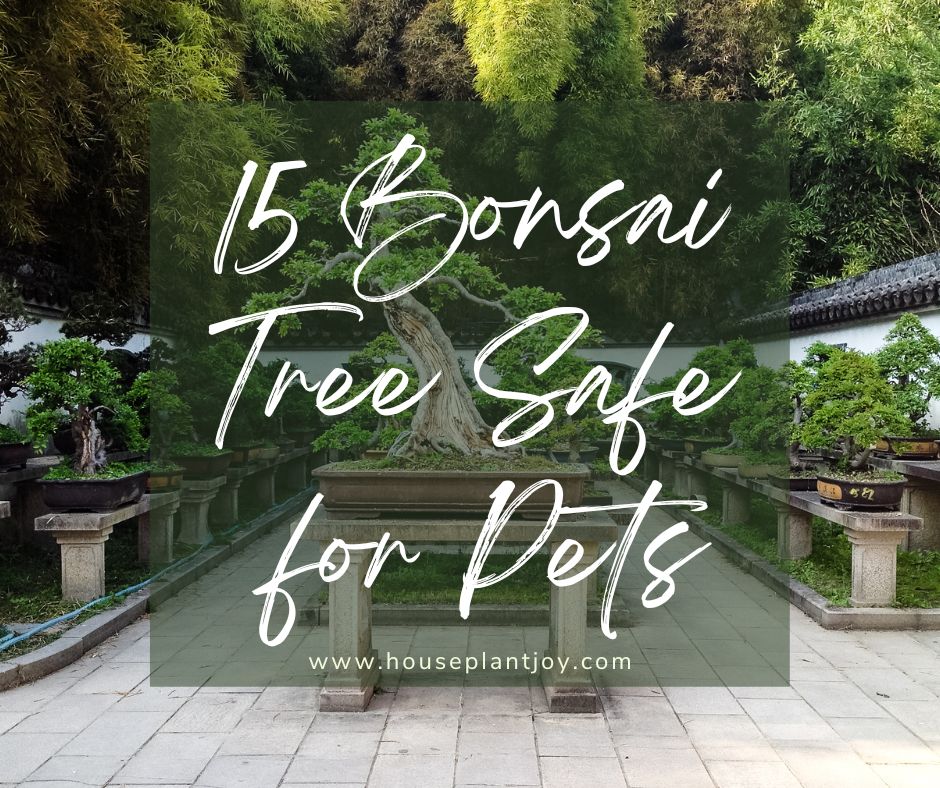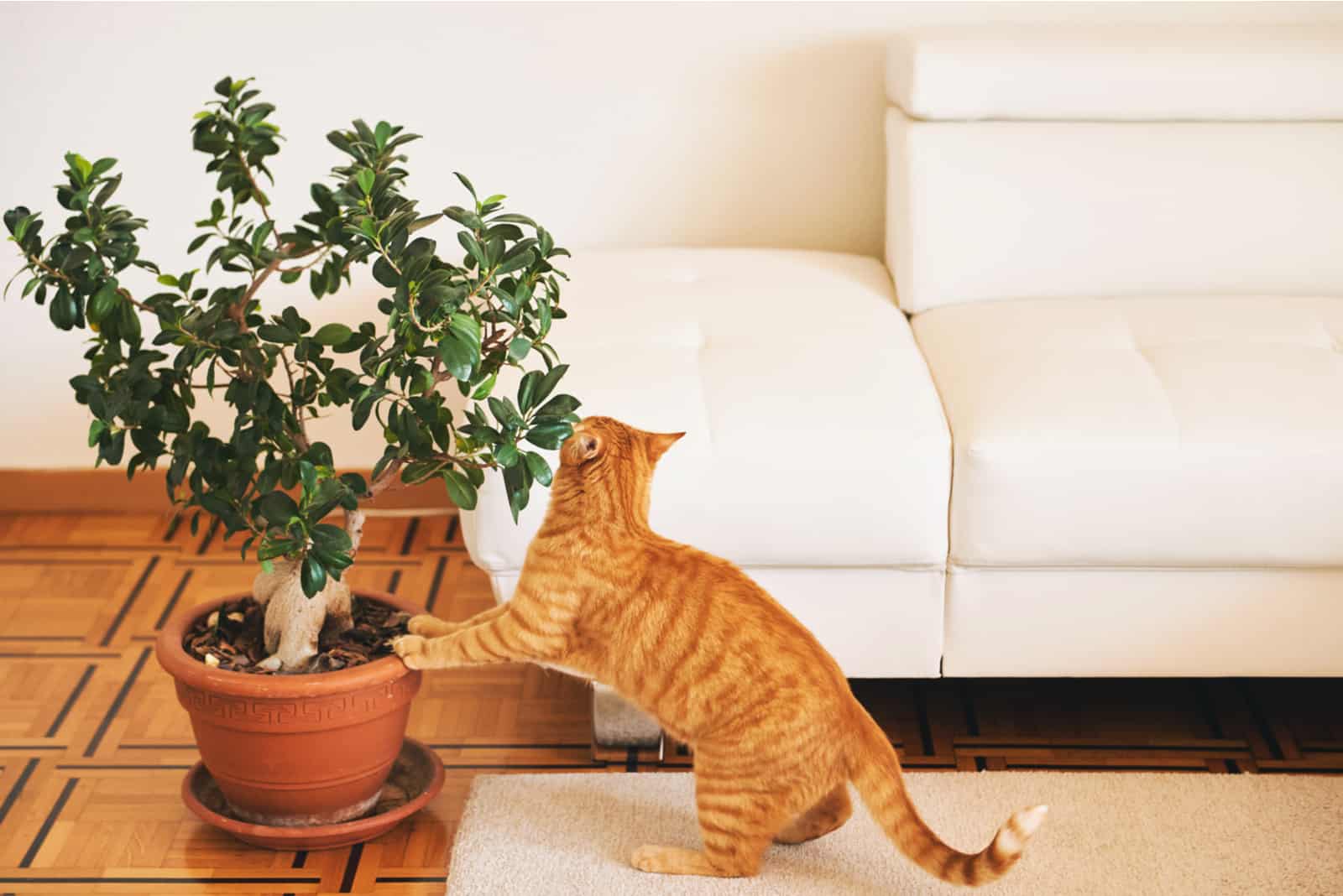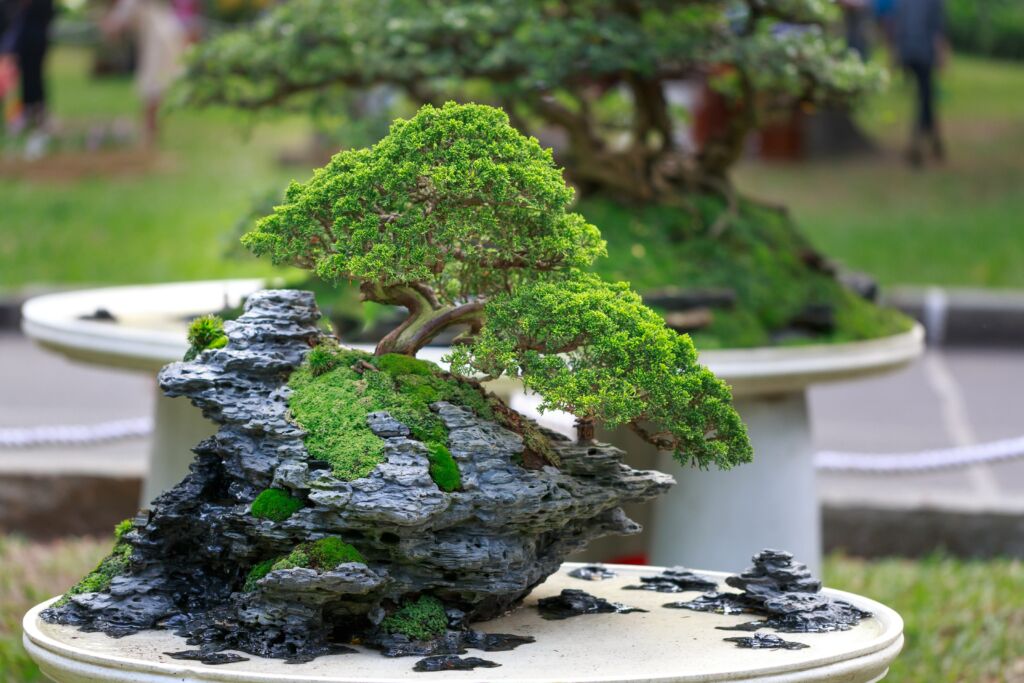HousePlantJoy is supported by our audience. When you purchase through one of our links, we may earn a small affiliate commission. As an Amazon Associate I earn from qualifying purchases. Your cost is not affected.
==================
A bonsai tree is a miniature tree grown in a container, meticulously pruned and shaped to mimic the appearance of a mature tree. Originating in Japan, these trees have become popular worldwide for their beauty and appeal.
It’s essential to consider pet safety when choosing a bonsai tree, especially if you have cats or dogs that may interact with the plant. Some bonsai trees can be toxic or poisonous to pets if ingested, causing various health issues.
A bonsai tree safe for pets should be a priority for pet owners. Not all bonsai trees are toxic. Many non-toxic ones are available, suitable for households with pets. However, some popular options, like the sago palm tree, are highly toxic to cats. Other bonsai trees, such as jade or cherry trees, can also pose dangers. Researching the specific type of bonsai tree you’re interested in is essential, as even non-toxic plants can cause milder symptoms like skin irritation.
Be cautious when selecting a bonsai tree, and prioritize your pet’s safety to enjoy the beauty of these miniature trees without risks.
Factors to Consider When Choosing a Bonsai Tree for A Pet-friendly Environment
If you’re a bonsai enthusiast who loves pets, choosing bonsai trees that are safe for your furry friends is crucial. Here are some factors you should consider when selecting a bonsai tree safe for pets.
Potential Toxicity of Plants to Pets
The first and foremost factor to consider is the potential toxicity of plants to pets. Researching and choosing a non-toxic bonsai tree for your pets is essential. However, some bonsai trees, such as sago palm and Chinese rubber plant, are highly toxic to pets and can cause liver damage, difficulty breathing, and even death. So, choosing a bonsai tree safe for pets and avoiding toxic bonsai trees is crucial.
Size and Location of Bonsai
The size and location of your bonsai tree are other important factors. If you have a small apartment or a house with limited space, choosing a miniature bonsai tree that only takes up a little space is best. Also, consider the location of your bonsai tree. If you have curious cats who love to explore and consume plants, it’s best to place your bonsai tree where your pets can’t easily reach them. This will help prevent your pets from ingesting the tree and experiencing any potential adverse effects.
Type of Soil and Fertilizers Used
The type of soil and fertilizers you use for your bonsai tree can also impact your pet’s health. Some fertilizers can be toxic to pets and can cause symptoms such as excessive drooling, bright red gums, and even liver failure. Choosing pet-friendly soil and fertilizers that are non-toxic to your pets is essential. You can also consult your vet for recommendations on safe soil and fertilizers for your bonsai tree.
Maintenance and Care
Lastly, consider the maintenance and care required for your bonsai tree. Bonsai trees need regular pruning, watering, and fertilizing to thrive. If you’re busy and don’t have much time for maintenance, it’s best to choose a bonsai tree that requires minimal care. On the other hand, if you’re a bonsai enthusiast who enjoys caring for your trees, you can choose a bonsai tree that requires more attention.
15 Bonsai Trees Safe for Pets
If you’re a bonsai enthusiast and a pet owner, you may wonder if a bonsai tree is safe for pets. Fortunately, not all bonsai trees are toxic to pets. Here’s a list of 15 safe bonsai trees for your furry friends.
Ficus (Ficus Benjamina)
The Ficus benjamina, commonly known as the weeping fig, is an attractive and versatile bonsai tree. Its glossy green leaves and graceful weeping branches make it an appealing addition to any home or office. Its most striking feature is its ability to adapt to various environments, making it a perfect choice for bonsai enthusiasts. Moreover, the Ficus benjamina is a bonsai tree safe for pets, making it a popular choice for pet owners. Unlike some bonsai trees, it doesn’t have toxic components that could harm your furry friends.
Care Requirements
Taking care of a Ficus benjamina is relatively easy. Please place it in a spot with bright, indirect light, and ensure it has a well-draining soil mix. Water the plant thoroughly once the top inch of soil feels dry, and maintain a consistent watering schedule. Fertilize your Ficus every 4-6 weeks during the growing season.
Boston Fern (Nephrolepis Exaltata)
The Boston Fern is a popular houseplant with feathery fronds that give it an airy and delicate appearance. It adds a touch of greenery to any space and is known for its ability to purify the air. Boston Ferns are non-toxic to pets, making them a safe choice for households with furry companions.
Care Requirements
Boston Ferns require a humid environment, so mist them regularly or place them on a tray filled with water and pebbles. Water the soil when it feels dry, but avoid overwatering. Keep your fern in indirect sunlight, and fertilize it once a month during the growing season.
Spider Plant (Chlorophytum Comosum)
The Spider Plant is known for its variegated leaves that arch gracefully from the center, resembling spider legs. Its natural ability to purify the air makes it an excellent choice for improving indoor air quality. Spider Plants are also non-toxic and safe for pets.
Care Requirements
Spider Plants thrive in bright, indirect light. Allow the soil to dry out slightly between waterings and water sparingly in winter. They prefer well-drained soil and can benefit from monthly fertilization during the growing season. Prune off any brown tips on the leaves to maintain a healthy appearance.
Maranta (Maranta Leuconeura)
Maranta, also known as the prayer plant, has strikingly patterned leaves that fold up at night, resembling praying hands. Its vibrant colors and unique leaf movement make it a captivating addition to any room. Marantas are safe for pets, as they are non-toxic to cats and dogs.
Care Requirements
Marantas thrive in bright, indirect light and high humidity. Keep the soil consistently moist but not soggy. Mist the plant regularly or use a humidifier to maintain a humid environment. Feed your Maranta a balanced liquid fertilizer every two weeks during the growing season.
Money Tree (Pachira Aquatica)
The Money Tree is a popular houseplant known for its braided trunk and lush green leaves. It is considered a symbol of good luck and prosperity in many cultures. Money Trees are non-toxic to pets, making them a safe and attractive addition to any home.
Care Requirements
Money Trees prefer bright, indirect light. Water them when the top 2 inches of soil feel dry, and reduce watering in the winter months. They prefer well-drained soil and appreciate occasional misting to increase humidity. Fertilize your Money Tree every two months with a balanced liquid fertilizer during the growing season.
Parlor Palm (Chamaedorea Elegans)
The Parlor Palm is an elegant houseplant with feathery, dark green fronds. Its ability to adapt to low light and humidity makes it a favorite for homes and offices. Parlor Palms are safe for pets and non-toxic to cats and dogs.
Care Requirements
Parlor Palms prefer bright, indirect light but can tolerate low-light conditions. Water them when the top inch of soil feels dry, and reduce watering in the winter. They prefer well-drained soil and benefit from regular misting. Fertilize your Parlor Palm every 6-8 weeks during the growing season with a balanced liquid fertilizer.
Ponytail Palm (Beaucarnea Recurvata)
The Ponytail Palm is a unique and eye-catching houseplant with a bulbous trunk and long, cascading leaves resembling a ponytail. Despite its name, it is not a true palm but a succulent. It is non-toxic and safe for pets.
Care Requirements
Ponytail Palms prefer bright light but can tolerate some direct sunlight. Allow the soil to dry out between waterings, as they are drought-tolerant. Use well-drained soil and avoid overwatering to prevent root rot. Feed your Ponytail Palm with a balanced liquid fertilizer every 2-3 months during the growing season.
African Violet (Saintpaulia)
African Violets are popular houseplants known for their beautiful, velvety flowers in various colors. Their compact size and colorful blooms make them a favorite among indoor gardeners. They are also safe for pets, being non-toxic to cats and dogs.
Care Requirements
African Violets prefer bright, indirect light and thrive under fluorescent lights. Keep the soil consistently moist, but avoid getting the leaves wet, which can cause spotting. Use room-temperature water and fertilize every two weeks with a balanced liquid fertilizer. Remove faded flowers and leaves to encourage new growth.
Moth Orchid (Phalaenopsis)
Moth Orchids are known for their stunning, long-lasting flowers in various colors. Their elegant appearance and ease of care make them a popular choice for home gardeners. Moth Orchids are non-toxic to pets, making them a safe choice for households with furry companions.
Care Requirements
Moth Orchids prefer bright, indirect light. Water them sparingly, allowing the soil to dry out between waterings. They prefer a well-drained orchid mix and benefit from regular misting to increase humidity. Fertilize your Moth Orchid with a balanced liquid fertilizer every two weeks during the growing season.
Areca Palm (Dypsis Lutescens)
The Areca Palm is a popular houseplant known for its feathery, arching fronds and elegant appearance. It is an excellent choice for adding a touch of tropical beauty to any room. Areca Palms are non-toxic to pets, making them a safe choice for pet owners.
Care Requirements
Areca Palms prefer bright, indirect light. Keep the soil consistently moist, but avoid overwatering. They prefer well-drained soil and benefit from regular misting to increase humidity. Fertilize your Areca Palm every 2-3 months with a balanced liquid fertilizer during the growing season.
Bamboo Palm (Chamaedorea Seifrizii)
The Bamboo Palm, also known as the Reed Palm, is known for its slender, bamboo-like stems and feathery fronds. It adds a touch of tropical elegance to any space and is known for its air-purifying properties. Bamboo Palms are non-toxic to pets, making them a safe addition to any home.
Care Requirements
Bamboo Palms prefer bright, indirect light but can tolerate lower light conditions. Keep the soil consistently moist, but avoid overwatering. They prefer well-drained soil and benefit from regular misting to increase humidity. Fertilize your Bamboo Palm every 6-8 weeks during the growing season with a balanced liquid fertilizer.
Olive Tree (Olea Europaea)
The Olive Tree is a popular choice for indoor gardening due to its silvery-green leaves and attractive, gnarled trunk. Its ability to adapt to indoor conditions and its non-toxic nature makes it a safe and attractive choice for households with pets.
Care Requirements
Olive Trees prefer bright, direct light. Allow the soil to dry out between waterings, as they are drought-tolerant. Use well-drained soil and avoid overwatering to prevent root rot. Fertilize your Olive Tree with a balanced liquid fertilizer every two months during the growing season.
Hawthorn (Crataegus)
Hawthorns are known for their attractive foliage, beautiful flowers, and colorful berries. They are popular choices for bonsai and make for a striking addition to any indoor garden. Hawthorns are non-toxic to pets, making them a safe choice for households with furry companions.
Care Requirements
Hawthorns prefer bright, direct light. Water them when the top inch of soil feels dry, and reduce watering in winter. They prefer well-drained soil and benefit from occasional misting to increase humidity. Fertilize your Hawthorn every 4-6 weeks during the growing season with a balanced liquid fertilizer.
Zelkova (Zelkova Serrata)
Zelkova trees are known for their attractive, serrated leaves and strong, upright growth habit. They are popular choices for bonsai and are non-toxic to pets, making them a safe addition to any home.
Care Requirements
Zelkova trees prefer bright, indirect light. Keep the soil consistently moist, but avoid overwatering. They prefer well-drained soil and benefit from regular misting to increase humidity. Fertilize your Zelkova every 4-6 weeks with a balanced liquid fertilizer during the growing season.
Chinese Elm (Ulmus Parvifolia)
The Chinese Elm is a popular choice for bonsai due to its attractive, serrated leaves and graceful, spreading growth habit. Its ability to adapt to indoor conditions and its non-toxic nature makes it a safe and attractive choice for households with pets.
Care Requirements
Chinese Elms prefer bright, indirect light. Keep the soil consistently moist, but avoid overwatering. They prefer well-drained soil and benefit from regular misting to increase humidity. Fertilize your Chinese Elm every 4-6 weeks with a balanced liquid fertilizer during the growing season.
Tips for Creating a Pet-Safe Environment
Creating a pet-safe environment is essential for pet owners who love bonsai trees. While bonsai trees are beautiful, some can be toxic to pets.
Providing Alternative Plants for Pets to Interact
Offer non-toxic plants like the bamboo palm or money tree for your pets to interact with. These plants are safe and can divert your pet’s attention away from bonsai trees that might be poisonous.
Placing Bonsai Trees In Areas Less Accessible to Pets
Place your bonsai trees in areas that are less accessible to your pets. Elevated shelves or rooms that your pets cannot enter are ideal locations.
Properly Disposing of Plant Trimmings
Properly dispose of plant trimmings, especially from toxic bonsai trees. Pets might ingest these trimmings, leading to poisoning.
It’s essential to ensure that your bonsai tree is safe for pets. Research the specific type of bonsai tree you own and consult a vet for further advice.
A Green Home with Safe Bonsais: Ensuring Pet Well-being
Balancing a love for verdant beauty with pet safety is crucial. It’s paramount to know whether a bonsai tree is safe for pets. While many bonsai trees elevate a space’s aesthetic, not all are non-toxic. Some bonsai trees, such as the sago palm tree, can be extremely toxic to cats, leading to symptoms like excessive drooling or even liver damage. However, believing all bonsais spell doom for pets is a misconception. There are non-toxic bonsai trees that can coexist perfectly with your feline friend.
Being a bonsai enthusiast also means recognizing the signs if a cat ingests something harmful. Immediate vet attention can mitigate the effects of ingestion. Equipped with the right knowledge, cat owners can cultivate a beautiful plant-filled ambiance without compromising the health of their cherished pets. Making informed choices ensures that every tree and plant in your home is beautiful and cat safe.
Frequently Asked Questions
Is a bonsai tree safe for pets?
Most bonsai trees are safe for pets, but some can be toxic. Before bringing one home, check the specific species and its safety for your furry friends.
What bonsai trees are poisonous to pets?
Some bonsai trees, including the sago palm and the jade tree, can be toxic to pets. These plants contain substances that can cause liver failure, skin irritation, and other harmful effects.
How can I tell if my bonsai tree is toxic?
Research your specific type of bonsai tree, as different species can have different toxicity levels. Look for signs of poisoning in your pets, such as excessive drooling, difficulty breathing, and bright red gums.
What should I do if my cat ingests a toxic bonsai tree?
If your cat ingests a toxic bonsai tree, contact your vet immediately. They can advise on the best action and may recommend inducing vomiting or administering activated charcoal to reduce toxin absorption.
Are there non-toxic bonsai trees safe for pets?
Yes, non-toxic bonsai trees, such as bamboo palm, plum bonsai, and fig trees, are safe for pets. Before purchasing any bonsai, research the specific species and confirm its safety for your pets.
? Discover the Green Magic! ?
Elevate your plant-parenting journey with HousePlantJoy! ? Follow us on a botanical adventure at houseplantjoy.com for expert care tips, inspiring DIY projects, and exclusive plant insights. Stay connected and join our thriving community on social media: like us on Facebook, double-tap your favorites on Instagram, pin your dreams on Pinterest, tweet with us on Twitter, and experience the fun side of plants on TikTok.
Unearth the joy of nurturing nature – let’s grow together! ??












